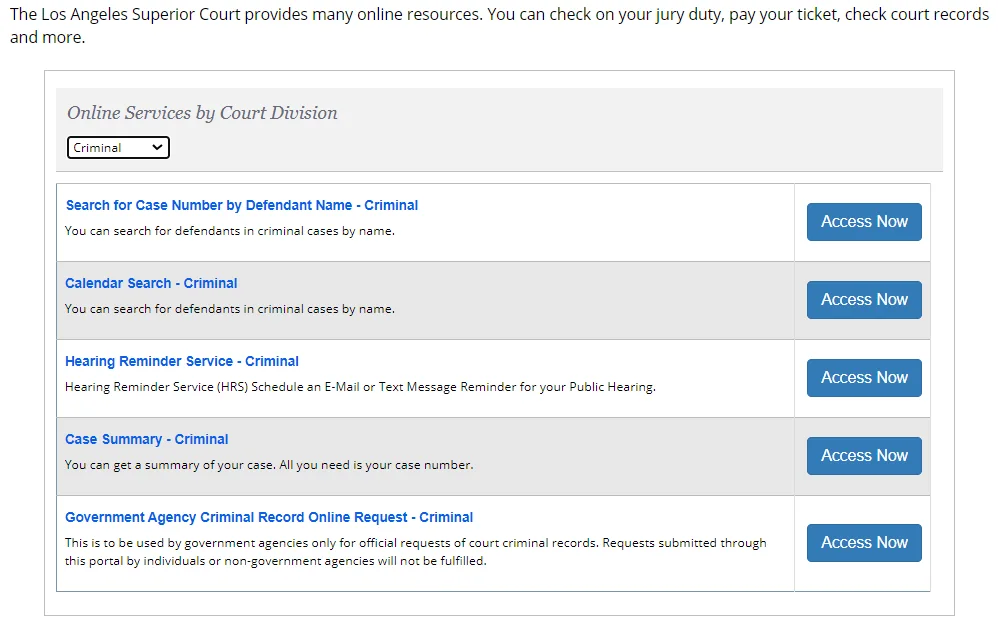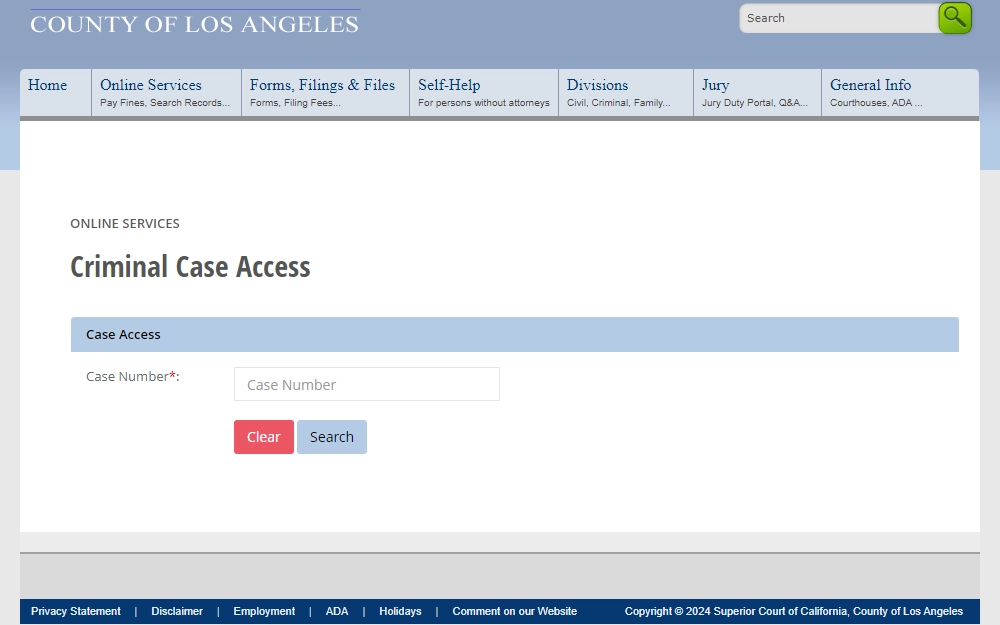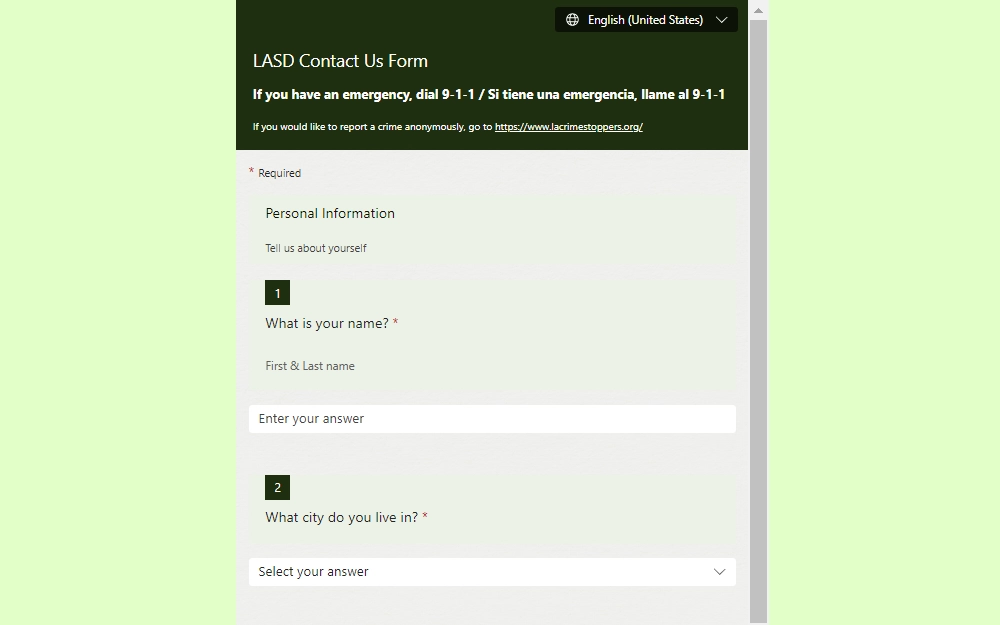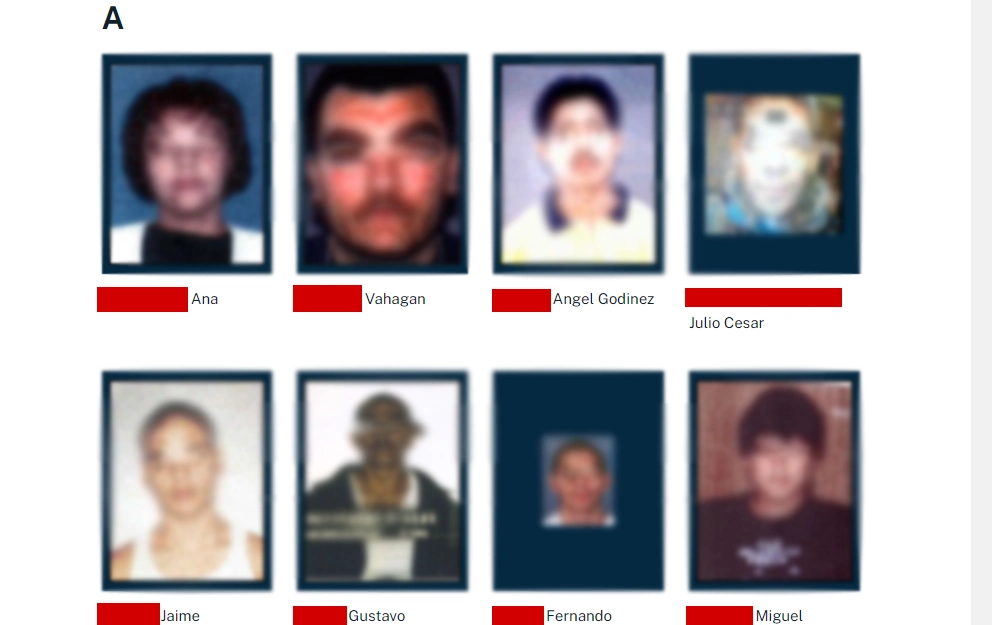Run a Los Angeles County warrant search today and uncover relevant information about court orders to be executed in the area.
Whether citizens are concerned about themselves or someone they know, or want to look up another person in the community, they can obtain warrant details under the California Public Records Act.
This streamlined article explains how to navigate Los Angeles resources to search and find information about warrants. It’ll also provide insight on how to address a warrant when one has been issued.
A Synopsis of Checking Free Warrant Information in Los Angeles County California
Los Angeles County offers an array of resources for individuals who currently have an active warrant against them. The reason why warrant records are readily available to the people is because the California Public Records Act mandates that information isn’t kept from those interested in looking at it.1
Warrants are issued by judges and represent court orders that must be complied with. The type of warrant issued will vary and depend on the type of court proceeding that’s in place and what the offender has allegedly done. More about types of warrants will be discussed below, but the important thing to know is that regardless of the type, there are ways to take care of a court order that has been issued.
Warrants are, in general, considered public records. Law enforcement is usually responsible for executing warrants. In Los Angeles County, citizens can work with both the Sheriff’s Office and the local police departments, depending on where the incident related to the warrant occurred.
There are dozens of police departments in the county. The biggest ones are the Los Angeles Police Department (LAPD) and the Long Beach Police Department (LBPD).
If working with law enforcement isn’t the most convenient option, citizens can also use the search tools provided by the Los Angeles Superior Court.2 They have some free tools and some which require the payment of a small fee. Still, one way or the other, retrieving information about warrants is relatively accessible.

This article will provide insight into each of those tools and resources, making way so that concerned citizens can run their own searches and become well-informed about warrants that are currently outstanding against them or someone in their circle.
How To Run a Los Angeles County Warrant Search
If anyone feels uncomfortable contacting law enforcement, they have the option of working with the Los Angeles Superior Court, which allows citizens to search their cases and obtain updated information about them in a few different ways.
Those who have an ongoing case with the Superior Court – and it doesn’t matter if it’s criminal, civil, or family-related – can use their case number to search for the status of the lawsuit and find out if there are active warrants issued against them. This search is free as long as the searcher has their case number.

Searches by name are available for a fee. In other words, if anyone needs to start a search from scratch, they can do so if they agree to pay for it. The fees may vary depending on what’s being searched, but they start at $1 per search.
How much a person will pay will depend, for example, on how many cases are contained in the search results and if the searcher creates an account and becomes a registered user (or if they prefer to make inquiries as a guest).
In that platform, criminal cases can be searched by the defendant’s name, while all other cases can be searched by any of the parties’ names.
If searchers don’t have a case number and don’t want to pay for their inquiries, then the alternative is to contact the court directly or have an attorney reach out to them or run a search on their behalf. In total, there are 36 courthouses in Los Angeles County, and those are some of the main ones:4
Stanley Mosk Courthouse
111 N Hill Street
Los Angeles, CA 90012
Phone: 213.745.3200
Clara Shortridge Fotlz Criminal Justice Center
210 W Temple Street
Los Angeles, CA 90012
Phone: 213.628.7700
Metropolitan Courthouse
1945 S Hill Street
Los Angeles, CA 90007
Phone: 213.745.3200
As it happens in most places, the Los Angeles Sheriff’s Office, along with the local law enforcement agencies in the area, is responsible for executing warrants issued by the judges in their courts.5
The Sheriff’s Office doesn’t provide information about warrants online and only suggests people go (in person) to any local law enforcement agency so they can run a search on their behalf. Doing so is risky because if there is indeed an active warrant in place, that person may be arrested on the stop without time to make preemptive arrangements.
Still, if the individual searching for warrants believes that contacting the Sheriff’s Office is advisable, they can do so using their online contact form or by reaching out to their office in person or by phone.6

There are many local stations throughout the county that can be contacted or visited, and a full list is available online.7 Here is contact information for the main one:
Los Angeles Sheriff’s Office
211 W Temple Street
Los Angeles, CA 90012
Phone: 213.299.1700
When an incident occurs in a place where the local police department has jurisdiction, they may be the agency responsible for keeping and executing the warrants connected to that event.
There are over 45 local police departments in Los Angeles County. Among them, the Los Angeles Police Department is the largest.
They have a list of the most wanted individuals available on their website.8 This isn’t a warrant search system but contains valuable information.

Like the Sheriff’s Office, the Los Angeles Police Department has many local stations.9 Concerned citizens can visit any of them or head straight to their headquarters:
Los Angeles Police Department
100 W. First St.
Los Angeles, California – 90012
Phone: 877.275.5273
Email: [email protected]
The Long Beach Police Department is the second biggest in Los Angeles County and can also execute warrants. Concerned citizens who live in Long Beach (or were involved in an incident in that area) can contact the Police Department using the following information:
Long Beach Police Department
400 W Broadway
Long Beach, CA 90802
Phone: 562.435.6711
A Rundown of Warrant Types & Their Implications
Warrants are issued to make sure that a judge’s order regarding a person or a case is obeyed as they intended. There are many types of warrants that can be issued, depending on the court proceedings that are taking place.
Search warrants, for example, are usually issued when law enforcement believes that someone has items or property that may serve as evidence in an ongoing case. Those warrants allow them to search that person’s belongings and seize anything that may be useful in their investigation.
Arrest warrants, on the other hand, allow law enforcement to arrest someone and frequently are the first step towards having someone answer for crimes they may have committed.
Bench warrants are, in a way, arrest warrants too. However, they’re issued when someone who’s being tried for a crime fails to appear in court at a set date – its goal is to force that person to appear and not delay the court proceedings any further.
There’s one type of warrant in California, though, which is quite particular. Ramey warrants allow law enforcement to arrest an individual and keep them in jail for 48 hours even if there’s no evidence yet that they committed a crime.
When a Ramey warrant is issued, law enforcement doesn’t need to show probable cause (like they would have to with an arrest warrant). And it may be that after 48 hours, the person will be set free without being even charged for anything. But if the police suspect someone is involved in a crime, they’re still allowed to arrest them, question them, and keep them in jail for that period of time.
One important thing to consider is that saying a warrant is active or open doesn’t refer to the type of court order it carries. It merely indicates that those warrants haven’t yet been executed or resolved. Any type of warrant may still be considered outstanding.
How To Respond to an Outstanding Warrant in Los Angeles County CA
Whenever someone has to handle a warrant, it’s important to be smart and act proactively to make sure the challenge is addressed in the best way possible.
This can be particularly difficult in Los Angeles County because there are so many different agencies and locations that could be contacted that it may be complicated for someone to choose wisely where to go – especially if they have never had to deal with a warrant before.
That said, two aspects are important to consider. First, before overstressing, people should know that some warrants can be handled in a relatively simple way, just by paying a fine or scheduling a court date to appear before the judge.
Second, in such a tricky environment, it is especially valuable to retain counsel. Hiring a good, experienced attorney can be advantageous in many ways: a lawyer can speak with law enforcement on their client’s behalf, they know how to navigate the court system, and they can provide sensible, reasonable advice.
Anyone who’s not familiar with the law enforcement agencies and the court system in Los Angeles County will benefit from having this kind of support.
However, if, after mindful consideration, going to law enforcement and turning themselves in is the best approach to deal with the warrant (or warrants) at hand, another two steps are valuable. In that scenario, contacting family and friends (whoever their support net is) to tell them what they’re about to do and how they can help is very important. No one should have to go through something like that alone.
Also, in an attempt to be released as quickly as possible, the target of the warrant should connect with a bondsman and make arrangements for bail to be posted at the first opportunity possible.
By doing that, people will be able to face their situation with a plan in place, which brings peace of mind and the ability to assess the circumstances and adjust the course as needed.
When someone has information about an offender at large and wishes to communicate what they know with law enforcement, they can do so by using tip lines. The Los Angeles Police Department, for example, has a wide array of numbers for different situations.10 No one should ever hesitate to contact them.
As much as it can be inconvenient to have to deal with a warrant, it’s possible to do it in a strategic manner. For that purpose, being able to access relevant information by running a Los Angeles County warrant search is priceless; everyone should feel comfortable and familiar with using those tools and resources whenever the need arises.
For a broader search of public records, you can find arrest information on anyone in Los Angeles County or view local mugshots online; or, to find additional warrant information for other counties in the state, track down records of anybody wanted in California.
References
1Commission on Peace Officer Standards and Training. (2024, January 8). California Public Records Act FAQs. Retrieved January 12, 2024, from <https://post.ca.gov/california-public-records-act-faqs>
2Los Angeles Superior Court. (n.d.). Online Services. LA Court. Retrieved January 12, 2024, from <https://www.lacourt.org/onlineservices/ON0001.aspx>
3Los Angeles Superior Court. (n.d.). Criminal Case Access. LA Court. Retrieved January 12, 2024, from <https://www.lacourt.org/criminalcasesummary/ui/>
4Los Angeles Superior Court. (n.d.). Courthouses in Los Angeles County – Contacts and Locations. LA Court. Retrieved January 12, 2024, from <https://www.lacourt.org/courthouse>
5Los Angeles County Sheriff’s Department. (n.d.). Records – FAQ. Retrieved January 12, 2024, from <https://lasd.org/records-faq/#warrant>
6Los Angeles County Sheriff’s Department. (n.d.). Contact Us. Retrieved January 12, 2024, from <https://lasd.org/contact-us/>
7Los Angeles County Sheriff’s Department. (n.d.). LSAD Phone Directory. Retrieved January 12, 2024, from <https://lasd.org/lasd-phone-directory/>
8Los Angeles Police Department. (n.d.). LAPD Most Wanted. Retrieved January 12, 2024, from <https://www.lapdonline.org/lapd-most-wanted/>
9Los Angeles Police Department. (n.d.). Find Your Local Police Station. Retrieved January 12, 2024, from <https://www.lapdonline.org/find-your-local-police-station/>
10Los Angeles Police Department. (n.d.). Contact Us. Retrieved January 12, 2024, from <https://www.lapdonline.org/contact-us/>
